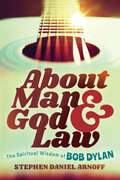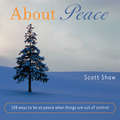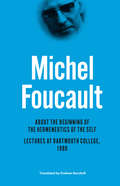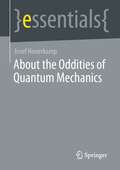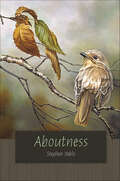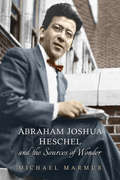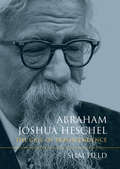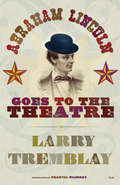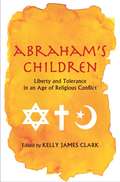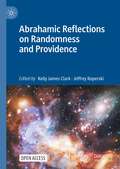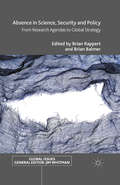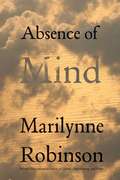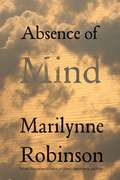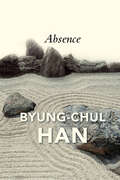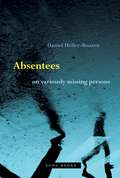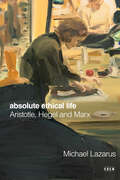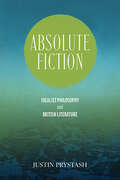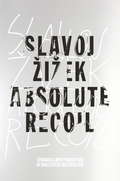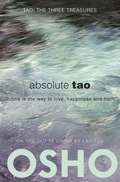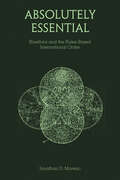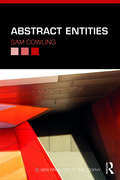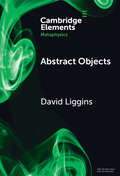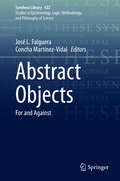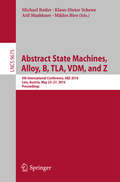- Table View
- List View
About Man and God and Law: The Spiritual Wisdom of Bob Dylan
by Stephen Daniel ArnoffAbout Man and God and Law is the story of how Bob Dylan sparked a revolution of the spirit and why it matters today.Many of our assumptions about empathy, sensual pleasure, and the essence of work, community, country, race, and the divine have germinated in Bob Dylan’s need to know what’s blowing in the wind and how it feels. Tracing his work and vision through themes that have shaped religious and cultural history for millennia, Stephen Daniel Arnoff uncovers how Bob Dylan has re-enchanted ancient questions of meaning and purpose throughout popular culture, inspiring a pantheon of prophetic musicians along the way. This field guide to Dylan's spiritual wisdom aims to make good on the promise that if we look closely enough at his body of work—precisely at a moment when the world we thought we knew seems like uncharted territory—we can open up our eyes to see not only where we really are, but where we need to go.
About Peace: 108 Ways to Be at Peace When Things Are Out of Control
by Scott ShawThese Zen meditations for modern times can help you find calm amid chaos. Conflict is a part of life. Zen Buddhism was even founded in conflict. No one can give anyone else peace: It comes to those who seek it—in the moment and for the moment only. But even as the pace accelerates and problems escalate, it&’s possible to gain inner peace. The past is gone and the future is unknown—so there&’s no time like the present to use these 108 meditations. They offer a very contemporary respite from internal and external conflict, well suited to the breakneck pace of life today. Their number and their form, however, is steeped in tradition. One hundred and eight is a sacred number in Buddhism, in which there is also the tradition of meditating with malas, strung beads which come in multiples of nine—27, 56, or 108. Their form follows Buddhist tradition as well: They are modern koans, or riddles to ponder, and dharma stories.
About the Beginning of the Hermeneutics of the Self: Lectures at Dartmouth College, 1980
by Michel FoucaultIn 1980, Michel Foucault began a vast project of research on the relationship between subjectivity and truth, an examination of conscience, confession, and truth-telling that would become a crucial feature of his life-long work on the relationship between knowledge, power, and the self. The lectures published here offer one of the clearest pathways into this project, contrasting Greco-Roman techniques of the self with those of early Christian monastic culture in order to uncover, in the latter, the historical origin of many of the features that still characterize the modern subject. They are accompanied by a public discussion and debate as well as by an interview with Michael Bess, all of which took place at the University of California, Berkeley, where Foucault delivered an earlier and slightly different version of these lectures. Foucault analyzes the practices of self-examination and confession in Greco-Roman antiquity and in the first centuries of Christianity in order to highlight a radical transformation from the ancient Delphic principle of “know thyself” to the monastic precept of “confess all of your thoughts to your spiritual guide.” His aim in doing so is to retrace the genealogy of the modern subject, which is inextricably tied to the emergence of the “hermeneutics of the self”—the necessity to explore one’s own thoughts and feelings and to confess them to a spiritual director—in early Christianity. According to Foucault, since some features of this Christian hermeneutics of the subject still determine our contemporary “gnoseologic” self, then the genealogy of the modern subject is both an ethical and a political enterprise, aiming to show that the “self” is nothing but the historical correlate of a series of technologies built into our history. Thus, from Foucault’s perspective, our main problem today is not to discover what “the self” is, but to try to analyze and change these technologies in order to change its form.
About the Oddities of Quantum Mechanics (essentials)
by Josef HonerkampQuantum mechanics is a physical theory for objects of the microcosm, e.g. for atoms or electrons. It has proven itself so far, but leads to the fact that we have to grant properties and relations to these objects, which are neither compatible with our common sense nor with the concepts of classical physics. These peculiarities are presented and their meaning for our cognitive faculty and for a world view is discussed.This Springer essential is a translation of the original German 1st edition essentials, Über die Merkwürdigkeiten der Quantenmechanik by Josef Honerkamp, published by Springer Fachmedien Wiesbaden GmbH, part of Springer Nature in 2020. The translation was done with the help of artificial intelligence (machine translation by the service DeepL.com). A subsequent human revision was done primarily in terms of content, so that the book will read stylistically differently from a conventional translation. Springer Nature works continuously to further the development of tools for the production of books and on the related technologies to support the authors.
Aboutness (Carl G. Hempel Lecture Series #3)
by Stephen YabloAboutness has been studied from any number of angles. Brentano made it the defining feature of the mental. Phenomenologists try to pin down the aboutness-features of particular mental states. Materialists sometimes claim to have grounded aboutness in natural regularities. Attempts have even been made, in library science and information theory, to operationalize the notion. But it has played no real role in philosophical semantics. This is surprising; sentences have aboutness-properties if anything does. Aboutness is the first book to examine through a philosophical lens the role of subject matter in meaning. A long-standing tradition sees meaning as truth-conditions, to be specified by listing the scenarios in which a sentence is true. Nothing is said about the principle of selection--about what in a scenario gets it onto the list. Subject matter is the missing link here. A sentence is true because of how matters stand where its subject matter is concerned. Stephen Yablo maintains that this is not just a feature of subject matter, but its essence. One indicates what a sentence is about by mapping out logical space according to its changing ways of being true or false. The notion of content that results--directed content--is brought to bear on a range of philosophical topics, including ontology, verisimilitude, knowledge, loose talk, assertive content, and philosophical methodology. Written by one of today's leading philosophers, Aboutness represents a major advance in semantics and the philosophy of language.
Abraham Joshua Heschel and the Sources of Wonder
by Michael MarmurAbraham Joshua Heschel (1907-1972) was one of the twentieth century's most influential Jewish thinkers, a respected theologian and enthusiastic civil rights activist who marched to Selma with Martin Luther King, Jr. His theology emphasized the immediacy of wonder and awe, yet his writing was studded with signs of his vast knowledge of traditional scholarship. No other Jewish thinker of note in the twentieth century used such a wide range of texts so extensively. Abraham Joshua Heschel and the Sources of Wonder is the first book to demonstrate how Heschel's political, intellectual, and spiritual commitments were embedded in his reading of Jewish tradition. By shedding new light on how Heschel's theological project reconciled the demands of tradition and the modern world, Michael Marmur offers an inspirational lesson in how contemporary Jewish thought can embrace both the texts of the past and the challenges of the present.
Abraham Joshua Heschel: The Call of Transcendence
by Shai Held&“Through Heschel, Held&’s work reaches out more broadly to treat us to a profound discussion of the great issues in contemporary Jewish theology&” (Arthur Green, Hebrew College Rabbinical School). Abraham Joshua Heschel (1907–1972) was a prolific scholar, impassioned theologian, and prominent activist who participated in the black civil rights movement and the campaign against the Vietnam War. He has been hailed as a hero, honored as a visionary, and endlessly quoted as a devotional writer. In this sympathetic, yet critical, examination, Shai Held elicits the overarching themes and unity of Heschel&’s incisive and insightful thought. Focusing on the idea of transcendence—or the movement from self-centeredness to God-centeredness—Held puts Heschel into dialogue with contemporary Jewish thinkers, Christian theologians, devotional writers, and philosophers of religion. &“Shai Held&’s book is a master class in one of the most significant Jewish voices of our time.&” —Tablet &“In this lucid and elegant study, one of the keenest minds in Jewish theology in our time probes the vision of one of the most profound spiritual writers of the twentieth century, uncovering a unity that others have missed and shedding light not only on Heschel but also on the characteristically modern habits of mind that impede the knowledge of God. The book is especially valuable for the connections it draws with other philosophers, theologians, and spiritual writers, Jewish and Christian. Enthusiastically recommended!&” —Jon D. Levenson, Harvard University &“[A] thoughtful, illuminating new study of Heschel&’s thought . . . It is one of the many virtues of Shai Held&’s book that it helps us to place Heschel alongside not only Kaplan but Halevi, Horovitz, and Rav Nahman―as well as the Psalmist.&” —Jewish Review of Books
Abraham Lincoln Goes to the Theatre
by Chantal Bilodeau Larry TremblayAbsurd, hilarious and haunting, Abraham Lincoln Goes to the Theatre is an unforgettable mystery that asks the question: How can we ever know who we are and what is true when the world we know is shifting beneath us? Its answer is simple: John Wilkes Booth was the ?rst American star-the actor who kidnapped reality to transform it into theatre.
Abraham's Children
by Kelly James ClarkScarcely any country in today's world can claim to be free of intolerance. Israel and Palestine, Northern Ireland, Sudan, the Balkans, Pakistan, India, Sri Lanka, and the Caucasus are just some of the areas of intractable conflict apparently inspired or exacerbated by religious differences. Can devoted Jews, Christians, or Muslims remain true to their own fundamental beliefs and practices, yet also find paths toward liberty, tolerance, and respect for those of other faiths? In this vitally important book, fifteen influential practitioners of the Abrahamic religions address religious liberty and tolerance from the perspectives of their own faith traditions. Former president Jimmy Carter, Rabbi Arik Ascherman, Indonesia’s first democratically elected president, Abdurrahman Wahid, and the other writers draw on their personal experiences and on the sacred writings that are central in their own religious lives. Rather than relying on "pure reason," as secularists might prefer, the contributors celebrate religious traditions and find within them a way toward mutual peace, uncompromised liberty, and principled tolerance. Offering a counterbalance to incendiary religious leaders who cite Holy Writ to justify intolerance and violence, the contributors reveal how tolerance and respect for believers in other faiths stand at the core of the Abrahamic traditions.
Abrahamic Reflections on Randomness and Providence
by Kelly James Clark Jeffrey KoperskiThis open access book addresses the question of how God can providentially govern apparently ungovernable randomness. Medieval theologians confidently held that God is provident, that is, God is the ultimate cause of or is responsible for everything that happens. However, scientific advances since the 19th century pose serious challenges to traditional views of providence. From Darwinian evolution to quantum mechanics, randomness has become an essential part of the scientific worldview. An interdisciplinary team of Muslim, Christian and Jewish scholars—biologists, physicists, philosophers and theologians—addresses questions of randomness and providence.
Abregé de philosophie
by Dieudonné NassaL'objectif majeur de ce document est de donner aux candidats au baccalauréat les moyens de réussir l'épreuve de philosophie. Il est aussi, destiné aux élèves des classes de première dans un style simplifié pour comprendre les notions du programme et pour les élèves des classes de seconde, l'essentiel à maîtriser et à retenir sur les principaux auteurs. Le document comprend plusieurs éléments d'informations qui sont les suivants : -la méthodologie de la dissertation et du commentaire de texte ; -des cours développés entièrement, de même que des résumés de cours ; -des textes et des sujets de réflexion ; -une présentation des principaux auteurs du programme.
Absence in Science, Security and Policy: From Research Agendas to Global Strategy (Global Issues)
by Brian Rappert Brian BalmerThis book explores the absent and missing in debates about science and security. Through varied case studies, including biological and chemical weapons control, science journalism, nanotechnology research and neuroethics, the contributors explore how matters become absent, ignored or forgotten and the implications for ethics, policy and society.The chapter 'Sensing Absence: How to See What Isn't There in the Study of Science and Security' is open access under a CC BY 4.0 license via link.springer.com.
Absence of Mind: The Dispelling of Inwardness from the Modern Myth of the Self
by Marilynne RobinsonEssays from the lectures delivered at Yale University, the Dwight Harrington Terry Foundation. Includes bibliographical references.
Absence of Mind: The Dispelling of Inwardness from the Modern Myth of the Self
by Marilynne RobinsonIn this ambitious book, acclaimed writer Marilynne Robinson applies her astute intellect to some of the most vexing topics in the history of human thought--science, religion, and consciousness. Crafted with the same care and insight as her award-winning novels, Absence of Mind challenges postmodern atheists who crusade against religion under the banner of science. In Robinson's view, scientific reasoning does not denote a sense of logical infallibility, as thinkers like Richard Dawkins might suggest. Instead, in its purest form, science represents a search for answers. It engages the problem of knowledge, an aspect of the mystery of consciousness, rather than providing a simple and final model of reality. By defending the importance of individual reflection, Robinson celebrates the power and variety of human consciousness in the tradition of William James. She explores the nature of subjectivity and considers the culture in which Sigmund Freud was situated and its influence on his model of self and civilization. Through keen interpretations of language, emotion, science, and poetry, Absence of Mind restores human consciousness to its central place in the religion-science debate.
Absence: On the Culture and Philosophy of the Far East
by Byung-Chul HanWestern thinking has long been dominated by essence, by a preoccupation with that which dwells in itself and delimits itself from the other. By contrast, Far Eastern thought is centred not on essence but on absence. The fundamental topos of Far Eastern thinking is not being but ‘the way’ (dao), which lacks the solidity and fixedness of essence. The difference between essence and absence is the difference between being and path, between dwelling and wandering. ‘A Zen monk should be without fixed abode, like the clouds, and without fixed support, like water’, said the Japanese Zen master Dōgen. Drawing on this fundamental distinction between essence and absence, Byung-Chul Han explores the differences between Western and Far Eastern philosophy, aesthetics, architecture and art, shedding fresh light on a culture of absence that may at first sight appear strange and unfamiliar to those in the West whose ways of thinking have been shaped for centuries by the preoccupation with essence.
Absentees: On Variously Missing Persons
by Daniel Heller-RoazenAn intellectually adventurous account of the role of nonpersons that explores their depiction in literature and challenges how they are defined in philosophy, law, and anthropology In thirteen interlocking chapters, Absentees explores the role of the missing in human communities, asking an urgent question: How does a person become a nonperson, whether by disappearance, disenfranchisement, or civil, social, or biological death? Only somebody can become a “nobody,” but, as Daniel Heller-Roazen shows, the ways of being a nonperson are as diverse and complex as they are mysterious and unpredictable. Heller-Roazen treats the variously missing persons of the subtitle in three parts: Vanishings, Lessenings, and Survivals. In each section and with multiple transhistorical and transcultural examples, he challenges the categories that define nonpersons in philosophy, ethics, law, and anthropology. Exclusion, infamy, and stigma; mortuary beliefs and customs; children’s games and state censuses; ghosts and “dead souls” illustrate the lives of those lacking or denied full personhood. In the archives of fiction, Heller-Roazen uncovers figurations of the missing—from Helen of Argos in Troy or Egypt to Hawthorne’s Wakefield, Swift’s Captain Gulliver, Kafka’s undead hunter Gracchus, and Chamisso’s long-lived shadowless Peter Schlemihl. Readers of The Enemy of All and No One’s Ways will find a continuation of those books’ intense intellectual adventures, with unexpected questions and arguments arising every step of the way. In a unique voice, Heller-Roazen’s thought and writing capture the intricacies of the all-too-human absent and absented.
Absolute Ethical Life: Aristotle, Hegel and Marx (Currencies: New Thinking for Financial Times)
by Michael LazarusKarl Marx gave us not just a critique of the political economy of capital but a way of confronting the impoverished ethical quality of life we face under capitalism. Interpreting Marx anew as an ethical thinker, Absolute Ethical Life provides crucial resources for understanding how freedom and rational agency are impacted by a social world formed by value under capitalism, with consequences for philosophy today. Michael Lazarus situates Marx within a shared tradition of ethical inquiry, placing him in close dialogue with Aristotle and Hegel. Lazarus traces the ethical and political dimensions of Marx's work missed by Hannah Arendt and Alasdair MacIntyre, two of the most profound critics of modern politics and ethics. Ultimately, the book claims that Marx's value-form theory is both a continuation of Aristotelian and Hegelian themes and at the same time his most distinctive theoretical achievement. In this normative interpretation of Marx, Lazarus integrates recent moral philosophy with a historically specific analysis of capitalism as a social form of life. He challenges contemporary political and economic theory to insist that any conception of modern life needs to account for capitalism. With a robust critique of capitalism derived from the determinations of what Marx calls the "form of value," Lazarus argues for an ethical life beyond capital.
Absolute Fiction: Idealist Philosophy and British Literature (SUNY series, Studies in the Long Nineteenth Century)
by Justin PrystashExplores the coevolution of Absolute idealist philosophy and British fiction from the Romantic period forward.Absolute Fiction examines the principal form of idealism in the modern period, Absolute idealism, which posits that mind and matter must be understood in relation to all of reality-the universe, the Absolute. This premise was variously articulated by philosophers and writers from Germany, Britain, India, and beyond. Absolute Fiction traces a genealogy from the creative adoption of Hinduism and German Idealism by Coleridge and Carlyle to Aldous Huxley's novelization of Advaita Vedānta. Justin Prystash argues that canonical figures, such as Hegel and George Eliot, as well as overlooked ones, such as May Sinclair and Anukul Chandra Mukerji, found in the Absolute a provocation to account for more and more swaths of reality-accounts that required, at the limits of philosophy, fictional prosthetics. The thematic and formal experimentation of Romanticism, realism, science fiction, horror/weird fiction, and modernism all draw upon Absolute idealism to reconceive subjectivity and ethics. These experiments, far from being antithetical to contemporary literary criticism, reveal it to be more idealist than many would like to acknowledge.
Absolute Recoil
by Slavoj ZizekPhilosophical materialism in all its forms - from scientific naturalism to Deleuzian New Materialism - has failed to meet the key theoretical and political challenges of the modern world. This is the burden of philosopher Slavoj i ek's argument in this pathbreaking and eclectic new work. Recent history has seen developments such as quantum physics and Freudian psychoanalysis, not to speak of the failure of twentieth-century communism, shake our understanding of existence.In the process, the dominant tradition in Western philosophy lost its moorings. To bring materialism up to date, i ek - himself a committed materialist and communist - proposes a radical revision of our intellectual heritage. He argues that dialectical materialism is the only true philosophical inheritor of what Hegel designated the "speculative" approach in thought.Absolute Recoil is a startling reformulation of the basis and possibilities of contemporary philosophy. While focusing on how to overcome the transcendental approach without regressing to naïve, pre-Kantian realism, i ek offers a series of excursions into today's political, artistic, and ideological landscape, from Arnold Schoenberg's music to the films of Ernst Lubitsch.From the Hardcover edition.
Absolute Tao
by Osho Osho International FoundationMoving beyond the usual interpretations of this classic Chinese text -- that of using it as an indicator of what to do next or attempting to predict the future -- Osho is using the Tao Te Ching as Lao Tzu intended: to ignite the flame of individual awareness and insight.His commentaries on these seven verses burn through every idea we may hold about ourselves until we can see with the same crystal clear light as Lao Tzu.
Absolutely Essential: Bioethics and the Rules-Based International Order (Basic Bioethics)
by Jonathan D. MorenoWhat the end of the post-World War II global political system means for bioethics and beyond.In Absolutely Essential, Jonathan Moreno explores the field of bioethics as both a creature and a key element of the post–World War II rules-based order. According to this order, international relations are to be organized according to principles of open markets, liberal democracy, and multilateral organizations.Drawing on the author&’s four decades of experience in the field, the book raises key questions about the future of bioethics in a changed world order, while also theorizing new ways to think about bioethics after the COVID-19 pandemic and the reordering of global alliances. For bioethicists, this book will contextualize the field in an entirely new light, while readers unfamiliar with bioethics will appreciate that this seemingly esoteric field is in fact a paradigmatic creation of the global system now undergoing sweeping change.
Abstract Entities (New Problems of Philosophy)
by Sam CowlingThink of a number, any number, or properties like fragility and humanity. These and other abstract entities are radically different from concrete entities like electrons and elbows. While concrete entities are located in space and time, have causes and effects, and are known through empirical means, abstract entities like meanings and possibilities are remarkably different. They seem to be immutable and imperceptible and to exist "outside" of space and time. This book provides a comprehensive critical assessment of the problems raised by abstract entities and the debates about existence, truth, and knowledge that surround them. It sets out the key issues that inform the metaphysical disagreement between platonists who accept abstract entities and nominalists who deny abstract entities exist. Beginning with the essentials of the platonist–nominalist debate, it explores the key arguments and issues informing the contemporary debate over abstract reality: arguments for platonism and their connections to semantics, science, and metaphysical explanation the abstract–concrete distinction and views about the nature of abstract reality epistemological puzzles surrounding our knowledge of mathematical entities and other abstract entities. arguments for nominalism premised upon concerns about paradox, parsimony, infinite regresses, underdetermination, and causal isolation nominalist options that seek to dispense with abstract entities. Including chapter summaries, annotated further reading, and a glossary, Abstract Entities is essential reading for anyone seeking a clear and authoritative introduction to the problems raised by abstract entities.
Abstract Objects (Elements in Metaphysics)
by David LigginsPhilosophers often debate the existence of such things as numbers and propositions, and say that if these objects exist, they are abstract. But what does it mean to call something 'abstract'? And do we have good reason to believe in the existence of abstract objects? This Element addresses those questions, putting newcomers to these debates in a position to understand what they concern and what are the most influential considerations at work in this area of metaphysics. It also provides advice on which lines of discussion promise to be the most fruitful.
Abstract Objects: For and Against (Synthese Library #422)
by José L. Falguera Concha Martínez-VidalThis volume examines the question “Do abstract objects exist?”, presenting new work from contributing authors across different branches of philosophy. The introduction overviews philosophical debate which considers: what objects qualify as abstract, what do we mean by the word "exist” and indeed, what evidence should count in favor or against the thesis that abstract objects exist. Through subsequent chapters readers will discover the ubiquity of abstract objects as each philosophical field is considered.Given the ubiquitous use of expressions that purportedly refer to abstract objects, we think that it is relevant to attend to the controversy between those who want to advocate the existence of abstract objects and those who stand against them. Contributions to this volume depict positions and debates that directly or indirectly involve taking one position or other about abstract objects of different kinds and categories. The volume provides a variety of samples of how positions for or against abstract objects can be used in different areas of philosophy in relation to different matters.
Abstract State Machines, Alloy, B, TLA, VDM, and Z: 5th International Conference, ABZ 2016, Linz, Austria, May 23-27, 2016, Proceedings (Lecture Notes in Computer Science #9675)
by Michael Butler Klaus-Dieter Schewe Atif Mashkoor Miklos BiroThis bookconstitutes the refereed proceedings of the 5th International Conference on AbstractState Machines, Alloy, B, TLA, VDM, and Z, ABZ 2016, held in Linz, Austria, inMay 2016. The 17 full and 15 short papers presented in this volume were carefullyreviewed and selected from 61 submissions. They record the latest researchdevelopments in state-based formal methods Abstract State Machines, Alloy, B,Circus, Event-B, TLS+, VDM and Z.
